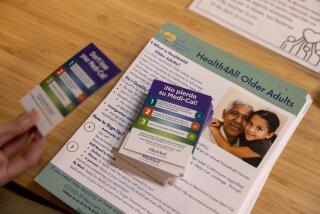Doctors in State Rescind Policy on Reporting HIV
In a major about-face that could affect thousands of HIV-positive state residents, the California Medical Assn. rescinded its year-old policy supporting mandatory reporting of people who test positive for the AIDS virus.
The new policy pledges cooperation with “public health authorities and experts in developing an HIV reporting policy” that “preserves patient-physician confidentiality.”
The strong vote to toss out the old policy, which came during the association’s annual convention in Anaheim, was a recognition that people at high risk for HIV infection would refuse testing if they knew their names would be reported to local health officials, physicians said.
“We do not want to do anything that would deter individuals from presenting themselves for testing,” association spokeswoman Danielle Walters said.
Last year, the group drew widespread criticism from AIDS organizations when it called for a change in the law that would require reporting anyone who tested positive for HIV, even if they had not developed full-blown AIDS.
Under state law, physicians are required to report anyone with AIDS, as well as tuberculosis, syphilis and some other communicable diseases.
But HIV infection alone does not have to be reported, a status many health workers believe is essential to maintain in order to guarantee anonymous testing. The fear is that people at risk for infection will be so concerned about discrimination in housing, employment and insurance that they will not be tested.
Proponents of mandatory reporting argue that it is necessary to ensure that a person’s sexual partners will be notified. The earlier that people with HIV are tested, the sooner they can begin treatment and notify partners or others who might have been exposed, health workers say.
But physicians, who spent much of the last year locked in internal debate over the issue, now say the risks of mandatory reporting outweigh the benefits.
A background paper that was circulated during the convention cited studies showing that mandating the reporting of people who test positive resulted in fewer people being tested. In one study conducted in Los Angeles at HIV test sites, 86.1% of the respondents said they would not have sought a test if they knew their name would be reported to a government agency.
“High-risk people will stay away from testing if it is not anonymous,” said Dr. Debra R. Judelson, an internist and cardiologist from Beverly Hills who led the fight to rescind the policy.
Now, 25 states require confidential reporting of HIV-infected individuals by name to local health authorities. California is one of 14 states that do not require reporting of HIV infection. Policies in the other states call for reporting on a limited basis.
Explaining the difference between this year’s vote and last year’s, Dr. Leonard Karpman, a San Francisco cardiologist, said: “We had time to put together the results of lots of other studies that showed us that we were in grave danger of [hurting] a lot of people,”
Darrel Cummings of the Los Angeles Gay and Lesbian Services Center, which tests about 800 people anonymously each month, praised Tuesday’s vote, as did other advocates for people with HIV and AIDS.
“We applaud the CMA decision to retract what was bad public health policy,” Cummings said. “Many of us around the state have been working very hard to see to it that the CMA position did not become law, so we are very pleased.”
“The CMA has taken a wonderful step in the right direction,” said Sue W. Scott of the AIDS Service Center in Pasadena. “Now we can all focus on what we really need to be working on, which is educating the public on preventive measures and making sure that those who think they have been exposed can get tested.”
In Sacramento, the author of a bill requiring mandatory reporting, Assemblyman Tom J. Bordonaro Jr. (R-Paso Robles), said it is too early to tell what impact the action will have on his legislation. But historically, the group has been one of the most powerful voices in shaping state health care policy.
The group’s action came as the physicians wound up their annual convention at the Disneyland Hotel. The physicians chose Dr. Rolland C. Lowe, a San Francisco surgeon, as the president-elect. He is the first Asian American to hold the post.
More to Read
Sign up for Essential California
The most important California stories and recommendations in your inbox every morning.
You may occasionally receive promotional content from the Los Angeles Times.









